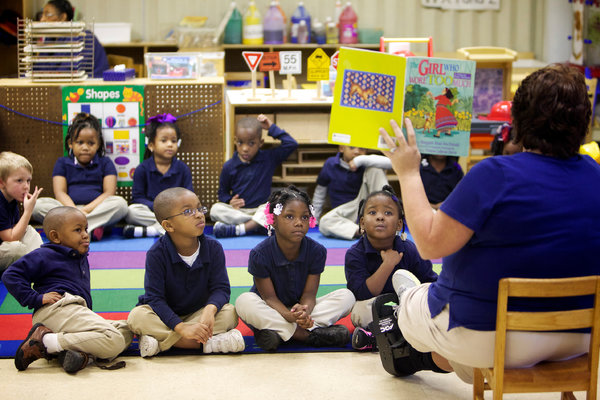Cue the hand-wringing about digital distraction: Fewer children are reading books frequently for fun, according to a new report released Thursday by Scholastic, the children’s book publisher.
为数字设备强大的分心效果痛心疾首吧。根据儿童图书出版商学乐教育集团(Scholastic)前不久发布的一份新报告,为享受乐趣而频繁读书的孩子比以前更少了。
In a 2014 survey of just over 1,000 children ages 6 to 17, only 31 percent said they read a book for fun almost daily, down from 37 percent four years ago.
在2014年针对大约1000名6岁至17岁孩子进行的一项调查中,仅有31%的受访者表示,他们几乎每天都会为获得乐趣而读书,这一比例较4年前的37%有所下降。

There were some consistent patterns among the heavier readers: For the younger children — ages 6 to 11 — being read aloud to regularly and having restricted online time were correlated with frequent reading; for the older children — ages 12 to 17 — one of the largest predictors was whether they had time to read on their own during the school day.
这些阅读量较大的孩子呈现出一些一致的模式:对于年幼的孩子(6岁至11岁)来说,时常听父母大声朗读,并限制上网时间,与频繁阅读呈正相关。而对于年龄较大的孩子(12岁至17岁)来说,最大的预测指标之一是,他们在校期间是否有时间自主阅读。
The finding about reading aloud to children long after toddlerhood may come as a surprise to some parents who read books to children at bedtime when they were very young but then tapered off. Last summer, the American Academy of Pediatrics announced a new policy recommending that all parents read to their children from birth.
给早已过了学步期的小孩大声朗读,竟然能够产生如此好的效果。一些家长在孩子很小的时候,经常在睡前给他们读书,但随后逐渐减少。这项发现或许会让他们感到惊讶。美国儿科研究院(American Academy of Pediatrics) 去年夏天宣布了一项新政策,建议所有家长在小孩出生后给他们朗读。
“A lot of parents assume that once kids begin to read independently, that now that is the best thing for them to do,” said Maggie McGuire, the vice president for a website for parents operated by Scholastic.
玛吉·麦圭尔(Maggie McGuire)在学乐教育集团专门为家长创建的一家网站担任副总裁。她说,“很多家长认为,一旦孩子开始独立阅读,他们就算大功告成了。”
But reading aloud through elementary school seemed to be connected to a love of reading generally. According to the report, 41 percent of frequent readers ages 6 to 10 were read aloud to at home, while only 13 percent of infrequent readers were being read to.
但在孩子的整个小学阶段坚持给他们朗读,似乎有助于培养其热爱读书的习惯。这份报告显示,在6岁至10岁的孩子中,41%的频繁阅读者经常在家听父母朗读,而仅有13%的非频繁阅读者正在接受这种熏陶。
Scholastic, which operates book fairs in schools and publishes popular children’s books including the Harry Potter and Captain Underpants series, has been commissioning the “Kids and Family Reading Report” since 2006. For the first time this year, the report, conducted by YouGov, a market research firm, looked at predictors that children of different ages would be frequent readers, defined as children who read books for fun five or more days a week.
学乐教育集团经常在学校举办图书展,出版过许多风靡一时的儿童读物,其中包括《哈利·波特》(Harry Potter)和《内裤超人》(Captain Underpants)系列图书。自2006年以来,这家公司一直委托研究机构制作《儿童与家庭阅读报告》(Kids and Family Reading Report)。这份由市场研究公司YouGov制作的报告,今年首次关注那些能够预测不同年龄段的孩子是否将成为频繁阅读者的指标。所谓“频繁阅读者”是指每周五天(或更多天数)会为享受乐趣而读书的孩子。
Kristen Harmeling, a partner at YouGov who worked on the report, said that children in the survey frequently cited reading aloud as a special bonding time with their parents. As children age, “I don’t think that parents know how important that time and the role that it plays in children’s lives,” she said.
参与这项研究的YouGov公司合伙人克里斯汀·哈梅林(Kristen Harmeling)指出,许多受访的孩子都认为,听父母朗读是一段特殊的亲密时刻。随着孩子一天天长大,“我不认为父母真正明白这段时间的重要意义,以及它在孩子的生活中扮演的角色,”她说。
Of course, children who love to read are generally immersed in households with lots of books and parents who like to read. So while parents who read to their children later in elementary school may encourage those children to become frequent readers on their own, such behavior can also result from “a whole constellation of other things that goes on in those families,” said Timothy Shanahan, professor emeritus of urban education at the University of Illinois at Chicago and a past president of the International Reading Association.
当然,爱读书的孩子通常来自拥有许多书籍,父母都喜欢读书的家庭。因此,尽管父母在孩子上小学高年级时坚持给他们朗读,或许有助于鼓励他们成为主动拿起书本的频繁阅读者,但这种行为也有可能产生自“这些书香门第发生的其他一系列事情。”伊利诺伊大学芝加哥分校(University of Illinois at Chicago)城市教育学荣誉教授,国际阅读协会(International Reading Association)前会长蒂莫西·沙纳汉(Timothy Shanahan)说。
There is not yet strong research that connects reading aloud at older ages to improved reading comprehension. But some literacy experts said that when parents or teachers read aloud to children even after they can read themselves, the children can hear more complex words or stories than they might tackle themselves.
目前还没有强有力的研究成果显示,给较大年龄的小孩大声朗读,有助于提高他们的阅读能力。但一些识字专家表示,甚至在小孩能够独立阅读之后,如果父母或老师继续给他们朗读,这些孩子就能够听到一些他们依靠自身能力还无法掌握的复杂单词或故事。
“It’s this idea of marinating children in higher-level vocabulary,” said Pam Allyn, founder of LitWorld.Org, a nonprofit group that works to increase literacy among young people. “The read-aloud can really lift the child.”
LitWorld.Org是一家致力于提高年轻人识字水平的非营利性组织,其创始人帕姆·阿林(Pam Allyn)表示,“这就是让孩子接受更高级别词汇熏陶的理念。听大声朗读,真的能够提升孩子的阅读能力。”
Other literacy experts say the real value of reading to children is helping to develop background knowledge in all kinds of topics as well as exposure to sophisticated language.
其他识字专家说,给孩子朗读不仅能够让他们接受复杂语言的熏陶,其真正的价值在于帮助他们掌握各种话题的背景知识。
“It wouldn’t have to be reading” to accomplish that, said Catherine Snow, a professor at the Harvard Graduate School of Education. “A two-minute conversation about something on television or something in a magazine or something that you’re reading yourself can also have some of the same positive effects as reading aloud.”
“要实现这一目标,不见得一定要给孩子朗读,”哈佛大学教育研究生院(Harvard Graduate School of Education)教授凯瑟琳·斯诺(Catherine Snow)说。 “花上两分钟时间跟孩子谈论电视、杂志或你自己正在阅读的书籍上出现的某个话题,也能产生与大声朗读同样积极的效果。”
Although the Scholastic report found that teenagers were more likely to read frequently for fun if they had dedicated independent reading time in school, only 17 percent of all children surveyed reported having time to read a book of their choice at school daily. Just 10 percent of 12- to 14-year-olds and 4 percent of 15- to 17-year-olds reported having that time in class. Such reading time at school may be particularly important for low-income children, who reported that they were more likely to read for fun at school than at home.
尽管学乐教育集团的报告发现,如果青少年在校期间有时间独立阅读,他们就更有可能为享受乐趣而频繁读书,但只有17%的受访孩子表示,他们每天在学校有时间阅读自己选择的书籍。仅有10%的12岁至14岁孩子,以及4%的15岁至17岁青少年报告说,他们在课堂上有时间进行独立阅读。对于低收入家庭的孩子来说,在校阅读的这段时间或许尤为重要。这些孩子报告说,相较于在家中,他们更有可能在学校享受读书的乐趣。
While previous studies have shown little connection between independent reading time at school and better reading habits or comprehension, some large school districts, including Boston and Chicago, encourage teachers to include time in the day for students to pick books and read.
虽然以前几乎没有研究显示,在校独立阅读和更好的阅读习惯或理解力存在关联,但包括波士顿和芝加哥在内的一些大学区鼓励教师每天给学生留一些时间,供他们挑选和阅读书籍。
Parents also see a connection. Emily Skelding, a mother of four in New Orleans and a former middle school teacher, said that her eldest son, Sumner, 15, used to devour books as a child. But now that he has no time at school to read on his own — or perhaps more significant, to choose the books he wants to read — “he stopped reading for pleasure,” Ms. Skelding said.
一些家长也发现了这种关联。居住在新奥尔良市的前中学教师艾米莉·斯科汀(Emily Skelding)有四个孩子。她说,15岁的大儿子萨姆纳小时候酷爱读书。但由于他现在在校期间没有时间自主阅读——或许更重要的是,无法选择自己想读的书,“萨姆纳已经不再为获得乐趣而读书了,”斯科汀说。












